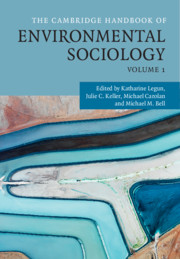Book contents
- The Cambridge Handbook of Environmental Sociology Volume 1
- The Cambridge Handbook of Environmental Sociology
- Copyright page
- Contents
- Figures
- Tables
- Contributors
- Foreword
- Introduction
- Part I Theory in Environmental Sociology
- Part II The Economy and Environmental Sociology
- Part III Culture and Environmental Sociology
- 12 Media and the Environmental Movement in a Digital Age
- 13 National Parks and (Neo)Colonialisms
- 14 Post Carbon Transition Futuring: For a Reconstructive Turn in the Environmental Social Sciences?
- 15 Outer Space and New Frontiers to Environmental Imaginations
- 16 New Territory for Environmental Sociology: Environmental Philosophy and Nature-Based Tourism
- Part IV Politics, Power, State
- Part V Social Justice
- Index
- References
14 - Post Carbon Transition Futuring: For a Reconstructive Turn in the Environmental Social Sciences?
from Part III - Culture and Environmental Sociology
Published online by Cambridge University Press: 05 November 2020
- The Cambridge Handbook of Environmental Sociology Volume 1
- The Cambridge Handbook of Environmental Sociology
- Copyright page
- Contents
- Figures
- Tables
- Contributors
- Foreword
- Introduction
- Part I Theory in Environmental Sociology
- Part II The Economy and Environmental Sociology
- Part III Culture and Environmental Sociology
- 12 Media and the Environmental Movement in a Digital Age
- 13 National Parks and (Neo)Colonialisms
- 14 Post Carbon Transition Futuring: For a Reconstructive Turn in the Environmental Social Sciences?
- 15 Outer Space and New Frontiers to Environmental Imaginations
- 16 New Territory for Environmental Sociology: Environmental Philosophy and Nature-Based Tourism
- Part IV Politics, Power, State
- Part V Social Justice
- Index
- References
Summary
Many environmental social scientists have seen our role as only empirically describing what occurs, from public opinion to social movements and risk perception. What is to be the contribution of environmental social sciences to imagining and building new low-carbon societies? This chapter reviews the “history of futuring” and its relation to environmental sociology. The rise of the concept of just transitions in particular and societal transitions more broadly have driven a new wave of envisioning of post-carbon futures, which has forced a set of more propositional approaches. We sketch eight positions, including the dominant “natural capitalism” and “breakthrough” ecomodernism, queer and anti-colonial transition thinking, and Geels’ multi-level perspective to design for transition. We review a number of red/green approaches: from “degrowth” and solidarity economics to red/green productivism and state-centered approaches, including the Green New Deal. Together, these represent significant new directions for environmental social sciences: not only describing social change, but also leading it. We argue this reconstructive turn in the environmental social sciences is much needed.
- Type
- Chapter
- Information
- The Cambridge Handbook of Environmental Sociology , pp. 223 - 242Publisher: Cambridge University PressPrint publication year: 2020
References
- 1
- Cited by

